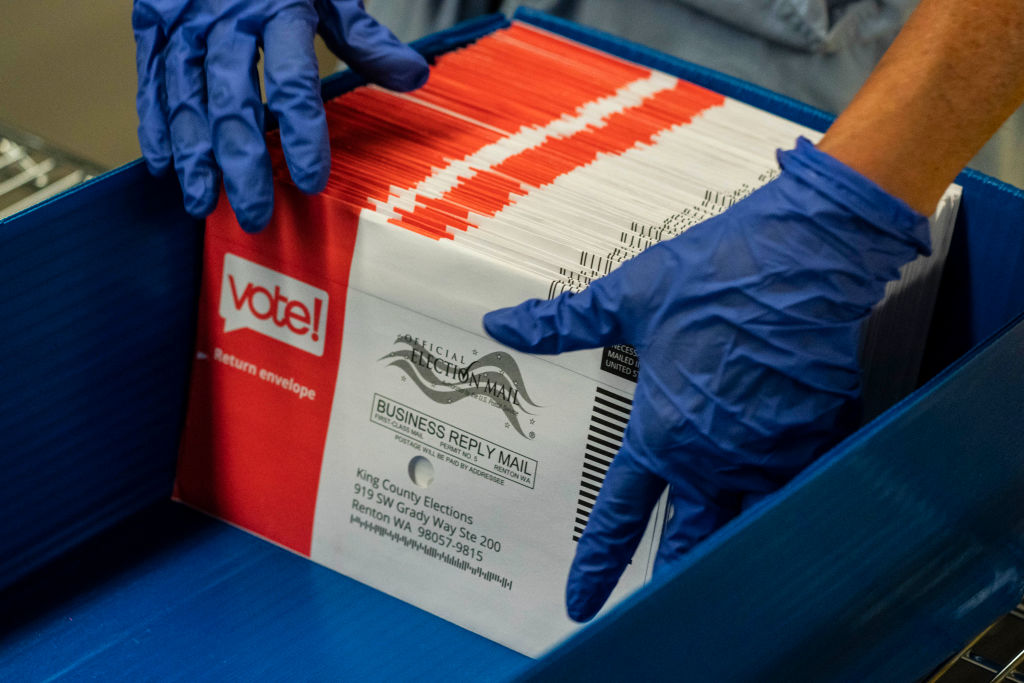Politics & Government
Election Fears Begin to Spread
A roundup of major concerns about voting in this year’s presidential election.

With 13 weeks to go before Election Day, a growing unease about the validity of the vote — and even of the ability of Americans to exercise the franchise — continues to surface in conversations about November 3. Here’s a sampling of media excerpts about recurring concerns.
The Guardian: “The U.S. Election Is in 100 Days: What are the Biggest Threats to It?”
Fewer Polling Stations
Alongside mail-in voting, election officials face an enormous challenge in figuring out how to offer sufficient in-person voting. Poll-workers tend to skew older – 58 percent were at least 61 years old in the 2018 general election – and have been dropping out over concerns they could contract COVID-19. Some places that typically hold voting – schools, churches, nursing homes – are also declining to serve in that capacity this year.
. . .
In Milwaukee, home to a sizable portion of Wisconsin’s African American population, officials closed 175 out of 180 polling stations for the state’s April statewide election. Turnout in the city dropped by 8.6 percentage points compared to voters outside the city, according to an analysis by the Brennan Center for Justice. Turnout among black voters in the city dropped by 10.2 percentage points.
New York Times: “What the Twitter Hack Revealed: An Election System Teeming With Risks”
Social Media
Had saboteurs infiltrated Twitter on Nov. 3 instead of in the middle of July, with the goal of upending the election, the political fallout could have been quite different. False warnings of a coronavirus outbreak in key precincts in Wisconsin or Pennsylvania could have untold impact on a close vote in a battleground state. Deceptive tweets from political party accounts saying polling places were closed could sow confusion. Or imagine a fake declaration, under Mr. Biden’s account, that he was dropping out of the race — a nightmare scenario for Democrats that some federal officials said they were talking about hypothetically among themselves on Wednesday night as the scope of Twitter’s failure became clear.
Maplight: “Election in Peril”
Coronavirus
The coronavirus pandemic has the potential to depress turnout by discouraging voters from visiting crowded polling places. Many states are taking a proactive approach by planning for increased mail ballots, which present a potentially unique set of challenges.
ABA Journal: “Four Threats to Anticipate Ahead of the 2020 Election”
False Flags
Disinformation about candidates or election will be circulated. Adav Noti, senior director, trial litigation and chief of staff at the Campaign Legal Center in Washington, D.C., and [Suzanne] Spaulding agree that a more significant threat is disinformation spread by malicious actors to manipulate the public’s confidence in the election system. This could include false information about polling places changing to different locations to suppress turnout or false claims that results were altered to cause disruption after the election. “One of the big lessons of 2016 is that there are very sophisticated actors, both within the United States and abroad, who are willing and able to exploit the wild west atmosphere online to advance their agenda,” says Noti, formerly with the Federal Election Commission. He encourages voters to remain skeptical of information they find online, while Spaulding contends that consistent use of paper ballots and post-election audits could help legitimize outcomes.
Pew Trusts: “Election Experts Warn of November Disaster”
Mail-In Ballot Issues
Millions of voters turned to mail-in ballots as a safe alternative to voting in person during the pandemic-riddled primary. But in states such as Georgia, Pennsylvania and Wisconsin, and in the District of Columbia, thousands of voters requested absentee ballots from local election officials and never received them. States were unprepared for the record numbers of absentee ballot requests, said Hannah Fried, national campaign director of All Voting is Local, a project of the Washington, D.C.-based nonprofit Leadership Conference Education Fund that helps register people of color and young people.
National Public Radio: “With November Approaching, Election Officials Still Face Safety, Security Fears”
Foreign Interference
The threat of foreign interference in the elections remains a concern, as it has been since the 2016 election. Intelligence officials continue to warn that foreign actors — especially Russia, China and Iran — are trying to disrupt this year’s voting with disinformation and attempted cyber attacks.

-

 Latest NewsFebruary 3, 2026
Latest NewsFebruary 3, 2026Amid the Violent Minnesota Raids, ICE Arrests Over 100 Refugees, Ships Many to Texas
-

 Featured VideoFebruary 4, 2026
Featured VideoFebruary 4, 2026Protesters Turn to Economic Disruption to Fight ICE
-

 The SlickFebruary 2, 2026
The SlickFebruary 2, 2026Colorado May Ask Big Oil to Leave Millions of Dollars in the Ground
-

 Column - State of InequalityFebruary 5, 2026
Column - State of InequalityFebruary 5, 2026Lawsuits Push Back on Trump’s Attack on Child Care
-

 Column - California UncoveredFebruary 6, 2026
Column - California UncoveredFebruary 6, 2026What It’s Like On the Front Line as Health Care Cuts Start to Hit
-

 The SlickFebruary 10, 2026
The SlickFebruary 10, 2026New Mexico Again Debates Greenhouse Gas Reductions as Snow Melts
-

 Latest NewsFebruary 12, 2026
Latest NewsFebruary 12, 2026Trump Administration ‘Wanted to Use Us as a Trophy,’ Says School Board Member Arrested Over Church Protest
-

 Latest NewsFebruary 10, 2026
Latest NewsFebruary 10, 2026Louisiana Bets Big on ‘Blue Ammonia.’ Communities Along Cancer Alley Brace for the Cost.

